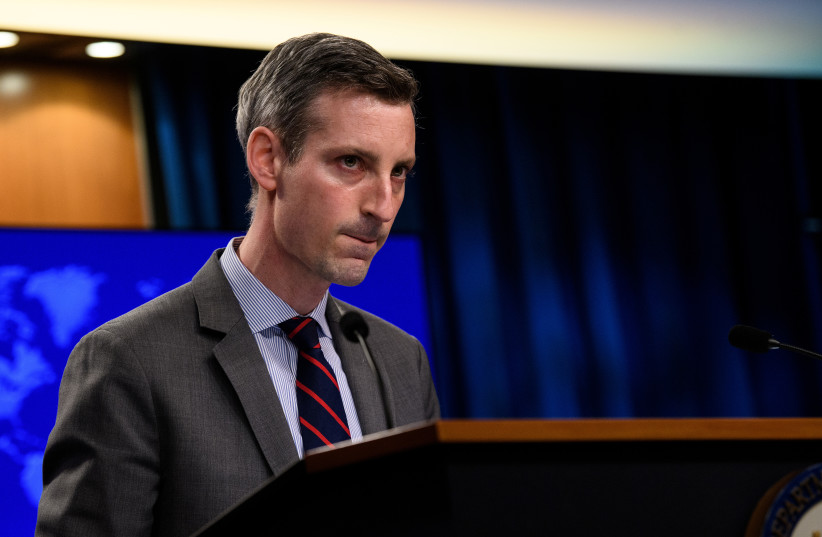WASHINGTON – State Department spokesman Ned Price said on Monday that while the US is “prepared for a return to full JCPOA implementation,” commonly known as the Iran nuclear deal, it is also “prepared for broader diplomatic efforts to resolve issues outside of the JCPOA and this specific nuclear file. We’re not going to negotiate in public, but what we can say is that if Iran wants sanctions-lifting that goes beyond the JCPOA, they’ll need to address concerns of ours that go beyond the JCPOA,” the Joint Comprehensive Plan of Action.
Delisting the Islamic Revolutionary Guard Corps (IRGC) from the Foreign Terrorist Organization (FTO) list remains the only major stumbling block between the US and Iran in their mutual efforts to revive the 2015 nuclear agreement. The IRGC designation was not a part of the original nuclear agreement, and would require the US and Iran to agree on that separately from the JCPOA itself, which is an agreement between the Islamic Republic and the superpowers.
“This is a statement that suggests that the Biden administration will not delist the IRGC,” said Dennis Ross, distinguished fellow at the Washington Institute for Near East Policy.
“Ned Price’s statement gets at the Iranian position that the JCPOA deals only with the nuclear issue and obligates the Iranians on nothing else, meaning it is unrelated to their actions in the region,” said Ross, who previously served as special assistant to president Barack Obama and National Security Council senior director for the Central Region. “The administration is saying if you want a sanction or designation lifted on a non-nuclear issue, then your behavior has to change in a non-nuclear area. Iran does not get to have it both ways, insisting it is not limited in the region and at the same time is entitled to the lifting of non-nuclear sanctions.”
Former Israeli ambassador to the US Michael Oren said that he was “guardedly optimistic” about the remarks.

“It seems to indicate that the United States is willing to delist the IRGC, but only on the condition that Iran is willing to stop all of its malign activities in the Middle East and beyond,” said Oren. “So in a certain way it could be calling Iran’s bluff: ‘Oh, you want to talk about the IRGC? That’s something that’s not related to Iran’s nuclear program. Okay. Well, let’s talk about everything, i.e., Iran’s support for terror and the development of intercontinental ballistic missiles.’”
Richard Goldberg, senior adviser at the Foundation for Defense of Democracies, said he does not believe the Biden administration has ever taken the IRGC delisting off the table.
“It’s been an ongoing negotiation all along,” he said. “There shouldn’t be any terrorism sanctions relief for Iran whatsoever without Iran halting its sponsorship of terrorism. But the Biden administration has already offered to lift terrorism sanctions on key financiers of the IRGC Quds Force, including the Central Bank of Iran and the National Iranian Oil Company, without any halt to the financing of terrorism. No one should be surprised if the administration removes the IRGC from the FTO list in exchange for platitudes on ‘regional de-escalation.’”
As negotiations between the sides have been stalled for weeks, Washington experts see three possible scenarios: the first option is a last-minute compromise, for example, if the sides decide to sign the JCPOA first and put aside the IRGC question for a later date. The second option would see one of the parties completely back down from its demands – an unlikely scenario. And last, that there might be no agreement.
There is another scenario in which instead of a “walkaway” there will be a “fadeaway” of the JCPOA. In this scenario, there would be no official announcement about the end of negotiations, and Iran would return to enrich uranium at high levels.
Implying that the international community is not prepared for such a scenario, Israel Ambassador to the US Michael Herzog made the point in his interview with The Washington Post last week that lifting sanctions from the Islamic Republic would provide Tehran with the funds for more destabilizing regional activities.
“Israel is concerned – and by the way, it’s not only Israel, also our neighbors in the region – that these funds will find their way to Iranian proxies, and we will feel it,” Herzog said. “It will destabilize the region.”
The ambassador believes that the FTO designation is not only something symbolic but rather a significant working tool that enables pushing criminal charges against entities that work with the IRGC.
